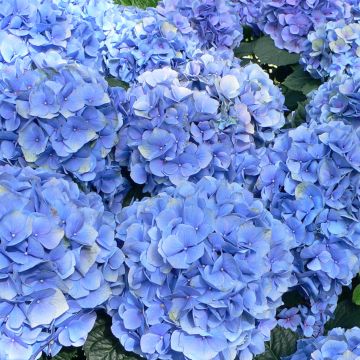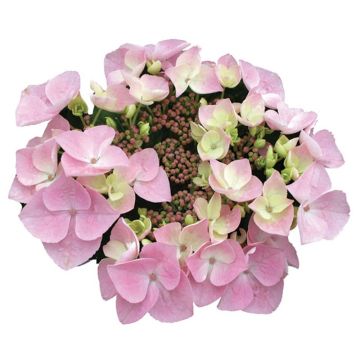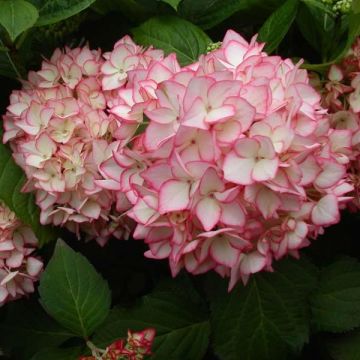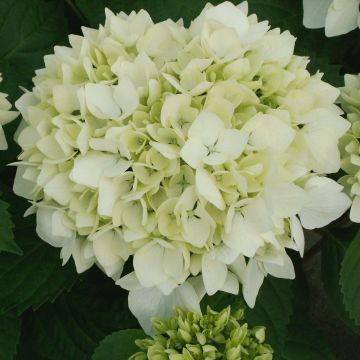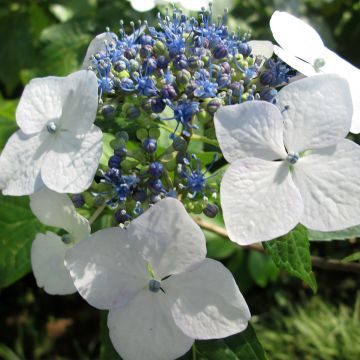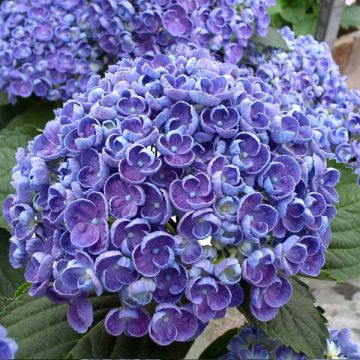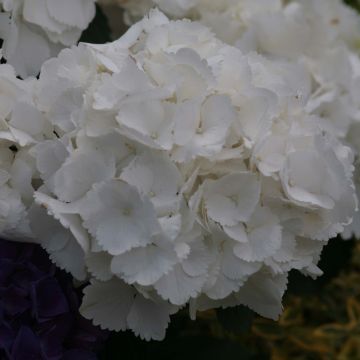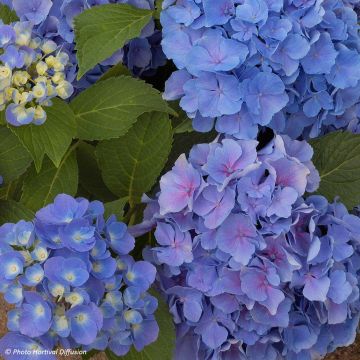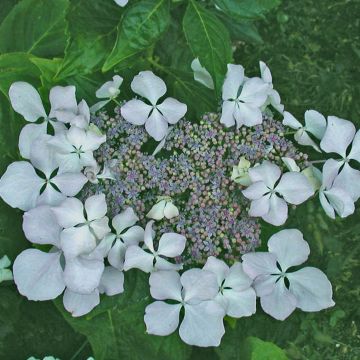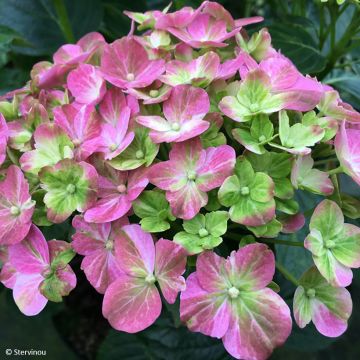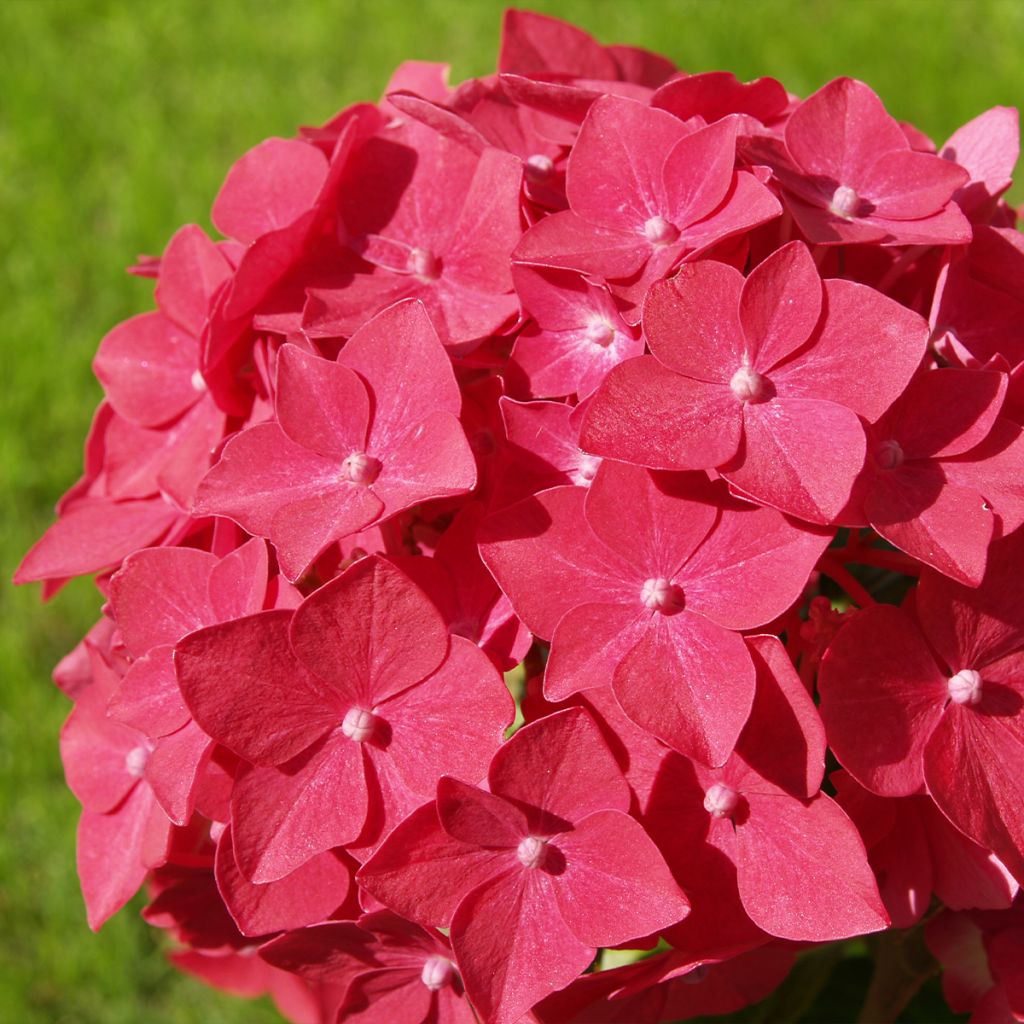

Hydrangea macrophylla Masja
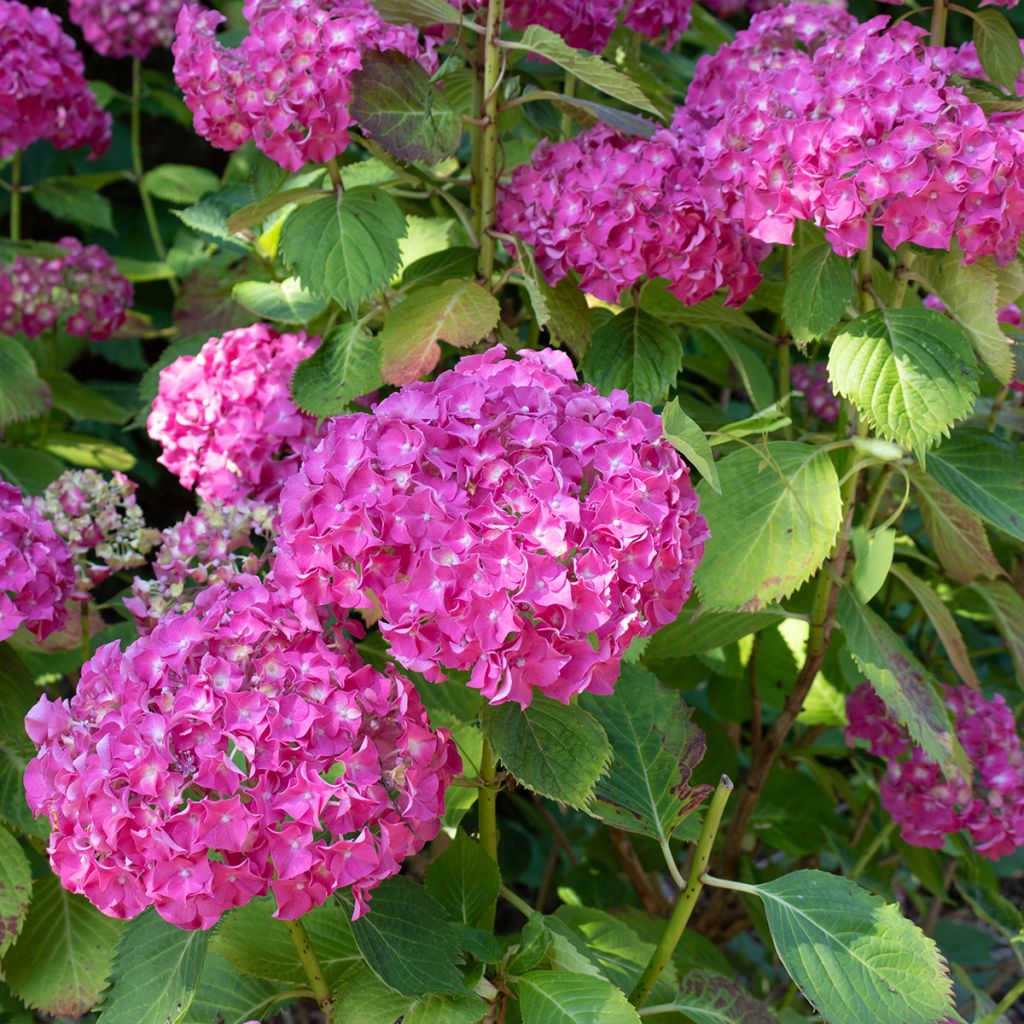

Hydrangea macrophylla Masja
Hydrangea macrophylla Masja
Hydrangea macrophylla Masja
Bigleaf Hydrangea, French Hydrangea
This item cannot be shipped to the selected country
Delivery charge from €5.90
More information
Schedule delivery date,
and select date in basket
This plant carries a 24 months recovery warranty
More information
We guarantee the quality of our plants for a full growing cycle, and will replace at our expense any plant that fails to recover under normal climatic and planting conditions.
From €5.90 for pickup delivery and €6.90 for home delivery
Express home delivery from €8.90.
Does this plant fit my garden?
Set up your Plantfit profile →
Description
Hydrangea macrophylla 'Masja' produces a dazzling deep red flowering, which stands out well against its bright green leaves. This variety has a rather slow growth rate and forms a compact bush, about 1m (3ft) in all directions, equally suited to pot culture as to open ground. Very hardy, place it in a semi-shaded location, in neutral to acidic soil. It is easy to grow, requiring only annual pruning in spring and watering in summer to keep the soil moist.
Hydrangea macrophylla is a deciduous bush, native to Japan, where its beauty has been appreciated for centuries and cited in poems dating back to the 8th century! Festivals are even dedicated to this bush. It is found in the wild on the island of Honshu (which houses the capital Tokyo), and it was introduced to Europe around 1789.
'Masja' is a relatively recent variety, dating from the 1980s, which was selected for its compact habit and its magnificent flowering. With a rather slow growth rate, it reaches about 1m (3ft) in height after 4 or 5 years, with a slightly greater width, forming a nice regular tuft. Its inflorescences appear in July and renew throughout summer. Its round, regular heads are made up of flowers with 4 fairly wide sepals, of a spectacular bright red colour. At the end of flowering, around September, or even October depending on the year, the flowers turn to purple-brown. The ovate leaves are a beautiful slightly shiny green, with rather marked serration. They yellow and then redden in autumn before falling. Like all hydrangea, it is not strictly an ericaceous soil plant. It prefers neutral to acidic soils, rich in humus. It is very hardy (-20°C (-4°F) or more. Severe frosts can damage the ends of the branches, but they easily regrow after pruning in the spring). Easy to grow, it can live a very long time.
'Masja' is a very good variety for pot or container cultivation, on a balcony or terrace sheltered from the afternoon sun. Planted in the garden, it will pair very well with spring-flowering bushes. Choose compact plants to avoid the risk of stifling it. For spring, a Camellia japonica will be ideal. The small Magnolia 'Susan', with its fragrant purplish-pink flowers in April-May, will also be a good companion.
Report an error about the product description
Hydrangea macrophylla Masja in pictures
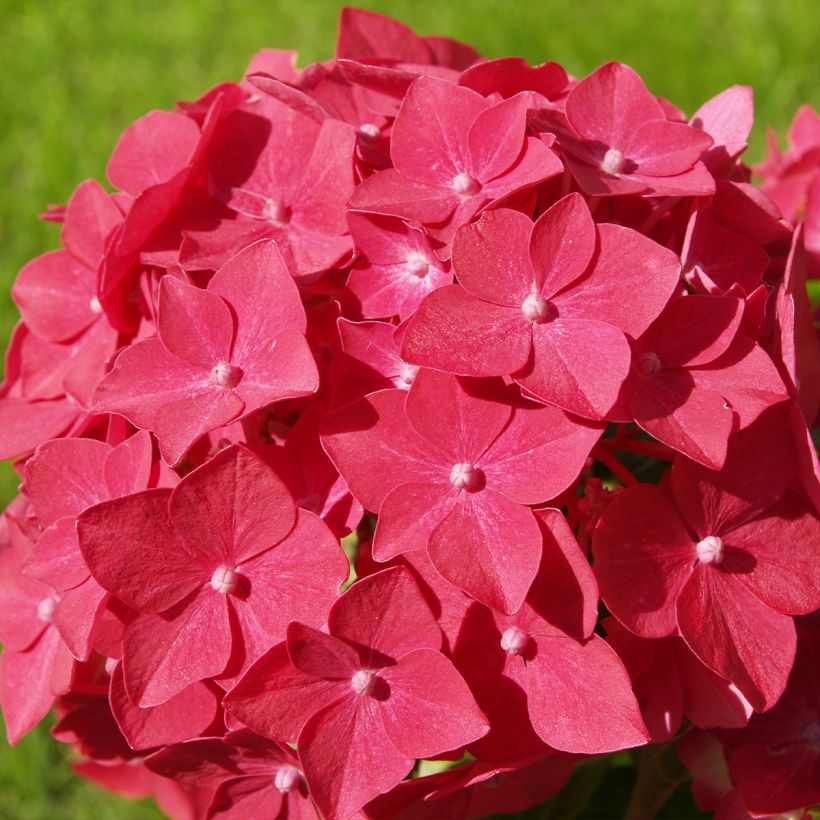

Plant habit
Flowering
Foliage
Botanical data
Hydrangea
macrophylla
Masja
Hydrangeaceae
Bigleaf Hydrangea, French Hydrangea
Sibilla
Cultivar or hybrid
Other Hydrangea Macrophylla
Planting and care
Plant in spring or early autumn, preferably in a semi-shaded position, for example against an east-facing, or even north-facing wall. In very cold regions, it may be prudent to protect its stump with a thick mulch. Protect it from cold, drying winds. It does not require acidic soil, but appreciates deep, moist but well-drained, fairly fertile soil, possibly enriched with a good base fertiliser before planting. If planting near a wall and the soil is dry at its base, place the root ball at least 30 to 40cm (12 to 16in) away from it and incorporate a quantity of well-decomposed compost to better retain moisture in the soil.
After planting, be careful of slugs, which are quite fond of young leaves. Hardy, it is not afraid to be planted in cold regions. Water regularly in hot weather to prevent the foliage from wilting during dry spells.
This variety of hydrangea is also particularly suitable for cultivation in pots or decorative containers due to its compact dimensions. In this case, make sure to choose an ericaceous plant soil, and water regularly to maintain moisture in the substrate. In case of cold winter, shelter the pot at the corner of a wall, or even in a garage in case of severe frost, as potted cultivation exposes the roots more to freezing temperatures.
Planting period
Intended location
Care
This item has not been reviewed yet - be the first to leave a review about it.
Haven't found what you were looking for?
Hardiness is the lowest winter temperature a plant can endure without suffering serious damage or even dying. However, hardiness is affected by location (a sheltered area, such as a patio), protection (winter cover) and soil type (hardiness is improved by well-drained soil).

Photo Sharing Terms & Conditions
In order to encourage gardeners to interact and share their experiences, Promesse de fleurs offers various media enabling content to be uploaded onto its Site - in particular via the ‘Photo sharing’ module.
The User agrees to refrain from:
- Posting any content that is illegal, prejudicial, insulting, racist, inciteful to hatred, revisionist, contrary to public decency, that infringes on privacy or on the privacy rights of third parties, in particular the publicity rights of persons and goods, intellectual property rights, or the right to privacy.
- Submitting content on behalf of a third party;
- Impersonate the identity of a third party and/or publish any personal information about a third party;
In general, the User undertakes to refrain from any unethical behaviour.
All Content (in particular text, comments, files, images, photos, videos, creative works, etc.), which may be subject to property or intellectual property rights, image or other private rights, shall remain the property of the User, subject to the limited rights granted by the terms of the licence granted by Promesse de fleurs as stated below. Users are at liberty to publish or not to publish such Content on the Site, notably via the ‘Photo Sharing’ facility, and accept that this Content shall be made public and freely accessible, notably on the Internet.
Users further acknowledge, undertake to have ,and guarantee that they hold all necessary rights and permissions to publish such material on the Site, in particular with regard to the legislation in force pertaining to any privacy, property, intellectual property, image, or contractual rights, or rights of any other nature. By publishing such Content on the Site, Users acknowledge accepting full liability as publishers of the Content within the meaning of the law, and grant Promesse de fleurs, free of charge, an inclusive, worldwide licence for the said Content for the entire duration of its publication, including all reproduction, representation, up/downloading, displaying, performing, transmission, and storage rights.
Users also grant permission for their name to be linked to the Content and accept that this link may not always be made available.
By engaging in posting material, Users consent to their Content becoming automatically accessible on the Internet, in particular on other sites and/or blogs and/or web pages of the Promesse de fleurs site, including in particular social pages and the Promesse de fleurs catalogue.
Users may secure the removal of entrusted content free of charge by issuing a simple request via our contact form.
The flowering period indicated on our website applies to countries and regions located in USDA zone 8 (France, the United Kingdom, Ireland, the Netherlands, etc.)
It will vary according to where you live:
- In zones 9 to 10 (Italy, Spain, Greece, etc.), flowering will occur about 2 to 4 weeks earlier.
- In zones 6 to 7 (Germany, Poland, Slovenia, and lower mountainous regions), flowering will be delayed by 2 to 3 weeks.
- In zone 5 (Central Europe, Scandinavia), blooming will be delayed by 3 to 5 weeks.
In temperate climates, pruning of spring-flowering shrubs (forsythia, spireas, etc.) should be done just after flowering.
Pruning of summer-flowering shrubs (Indian Lilac, Perovskia, etc.) can be done in winter or spring.
In cold regions as well as with frost-sensitive plants, avoid pruning too early when severe frosts may still occur.
The planting period indicated on our website applies to countries and regions located in USDA zone 8 (France, United Kingdom, Ireland, Netherlands).
It will vary according to where you live:
- In Mediterranean zones (Marseille, Madrid, Milan, etc.), autumn and winter are the best planting periods.
- In continental zones (Strasbourg, Munich, Vienna, etc.), delay planting by 2 to 3 weeks in spring and bring it forward by 2 to 4 weeks in autumn.
- In mountainous regions (the Alps, Pyrenees, Carpathians, etc.), it is best to plant in late spring (May-June) or late summer (August-September).
The harvesting period indicated on our website applies to countries and regions in USDA zone 8 (France, England, Ireland, the Netherlands).
In colder areas (Scandinavia, Poland, Austria...) fruit and vegetable harvests are likely to be delayed by 3-4 weeks.
In warmer areas (Italy, Spain, Greece, etc.), harvesting will probably take place earlier, depending on weather conditions.
The sowing periods indicated on our website apply to countries and regions within USDA Zone 8 (France, UK, Ireland, Netherlands).
In colder areas (Scandinavia, Poland, Austria...), delay any outdoor sowing by 3-4 weeks, or sow under glass.
In warmer climes (Italy, Spain, Greece, etc.), bring outdoor sowing forward by a few weeks.

































